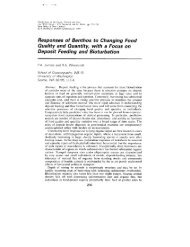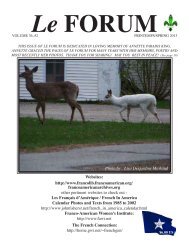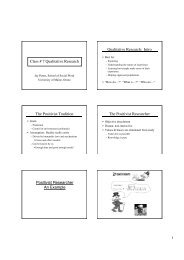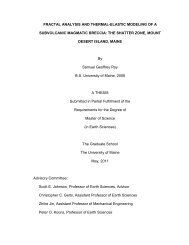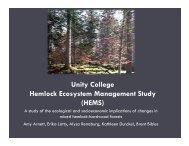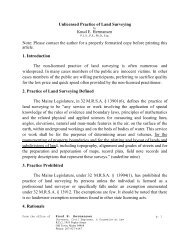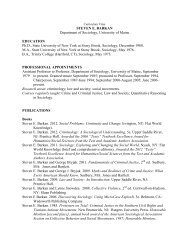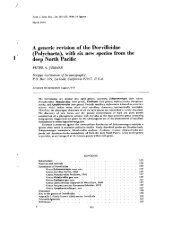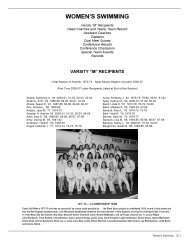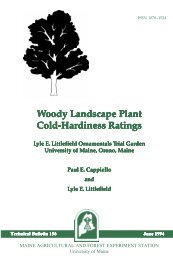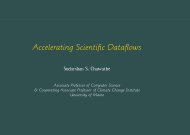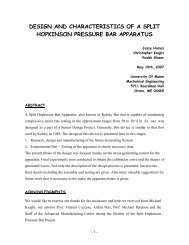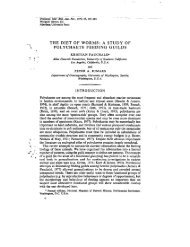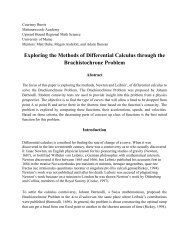Fact Sheet - University of Maine
Fact Sheet - University of Maine
Fact Sheet - University of Maine
You also want an ePaper? Increase the reach of your titles
YUMPU automatically turns print PDFs into web optimized ePapers that Google loves.
ENGLISH<br />
Program <strong>of</strong> Study<br />
Financial Aid<br />
Applying<br />
Correspondence<br />
The English Department <strong>of</strong>fers the M.A. degree with optional concentrations in Creative Writing,<br />
Composition/Pedagogy, Poetry and Poetics, and Gender and Literature. English M.A. students may<br />
also complete the interdisciplinary concentration in Women's Studies. The <strong>University</strong> <strong>of</strong> <strong>Maine</strong> does<br />
not <strong>of</strong>fer the M.F.A. or Ph.D. in English at this time.<br />
Students admitted to graduate study in the Department <strong>of</strong> English normally follow a 30-hour program<br />
<strong>of</strong> courses leading to the Master <strong>of</strong> Arts in English. Those whose undergraduate degree was not in<br />
English or Literature may be asked to complete a 39-hour program. All students take at least 15 hours<br />
<strong>of</strong> graduate literature or theory courses. Additional courses are chosen as appropriate to students’<br />
interests or concentration requirements. For more details, see the English Graduate Program website<br />
at http://english.umaine.edu/graduate-program/.<br />
The department awards twenty-one graduate teaching assistantships each fall, with approximately half<br />
<strong>of</strong> these usually assigned to new students. Recipients teach one section <strong>of</strong> first-year composition each<br />
semester; they receive stipends <strong>of</strong> approximately $14,100 for the nine-month school year as well as<br />
tuition remission for each semester and for two summers while enrolled in the program. During their<br />
first semester, all new teaching assistants must enroll in English 693, a seminar on teaching writing in<br />
which they work at understanding the goals and contexts <strong>of</strong> <strong>Maine</strong>’s first-year composition course and<br />
at planning effective course procedures. After that first semester, they are free to design their own<br />
courses as long as they observe course-wide goals and shared evaluation procedures. Those who teach<br />
well their first year normally have their assistantships renewed for one additional year. To apply for a<br />
teaching assistantship, please check the appropriate line on the graduate school application form and<br />
submit with your application a 1-2 page statement <strong>of</strong> your philosophy <strong>of</strong> teaching. The department<br />
welcomes applications from candidates with teaching experience, as well as from those desirous <strong>of</strong><br />
gaining such experience.<br />
Applicants to the program may also apply for scholarships awarded by the Graduate School.<br />
The Department <strong>of</strong> English accepts applications for the upcoming fall semester until the program is<br />
filled. Applicants who wish to apply for financial aid must submit a completed application including all<br />
test scores, letters <strong>of</strong> reference, transcript(s) and writing sample(s) on or before January 15. The<br />
Department requires current (test taken within 5 years) scores from the Graduate Record Examination<br />
(GRE) General Test. These scores must be reported to U<strong>Maine</strong> electronically from ETS (reporting<br />
code 3916). Applicants with limited background in English or Literature, as well as those who may<br />
wish to bolster a weak undergraduate GPA or low GRE scores, are encouraged but not required to take<br />
the GRE Subject Test in Literature in English. Applicants for whom English is a second language are<br />
also required to submit scores from the Test <strong>of</strong> English as a Foreign Language (TOEFL). We do not<br />
accept scores from the GMAT or LSAT.<br />
The Graduate School The English Department<br />
5755 Stodder Hall Room 42 5725 Neville Hall<br />
<strong>University</strong> <strong>of</strong> <strong>Maine</strong> <strong>University</strong> <strong>of</strong> <strong>Maine</strong><br />
Orono, ME 04469-5755 Orono, ME 04469<br />
207-581-3291 207-581-3835<br />
graduate@maine.edu englishgradstudies@umit.maine.edu
Graduate Faculty<br />
A. Patricia Burnes, Ph.D. (St. Louis <strong>University</strong>, 1977), Associate Pr<strong>of</strong>essor and Coordinator <strong>of</strong> College Composition. American literature,<br />
the development <strong>of</strong> writing ability.<br />
Benjamin Friedlander, Ph.D. (SUNY-Buffalo, 1999), Associate Pr<strong>of</strong>essor. Poetry and poetics; nineteenth- and twentieth-century<br />
American literature.<br />
Carla Billitteri, Ph.D. (SUNY at Buffalo, 2001), Assistant Pr<strong>of</strong>essor. Literary theory; feminist theory and gender studies; poetry and<br />
poetics; European and American Literature (19th- & 20th-century); drama.<br />
Charlsye Smith Diaz, Ph.D. (Texas Tech, 2004), Assistant Pr<strong>of</strong>essor and Coordinator <strong>of</strong> Pr<strong>of</strong>essional Writing. Pr<strong>of</strong>essional and Technical<br />
Communication.<br />
David Kress, Ph.D. (Pennsylvania State <strong>University</strong>, 2002), Assistant Pr<strong>of</strong>essor. Creative writing, fiction, critical theory.<br />
Deborah D. Rogers, Ph.D. (Columbia, 1982), Pr<strong>of</strong>essor. Restoration and eighteenth-century English literature.<br />
Dylan B. Dryer, Ph.D. (<strong>University</strong> <strong>of</strong> Wisconsin-Milwaukee, 2007). Assistant Pr<strong>of</strong>essor. Composition studies.<br />
Greg Howard, Ph.D. (<strong>University</strong> <strong>of</strong> Denver), Assistant Pr<strong>of</strong>essor. Fiction writing, American fiction, postmodern literature.<br />
Sarah Harlan-Haughey, Ph.D. (Cornell <strong>University</strong>, 2011), CLAS-Honors Preceptor. Medieval literature, folklore, oral traditional studies,<br />
and literature and the environment.<br />
Harvey Kail, Ph.D. (Northern Illinois, 1977), Pr<strong>of</strong>essor and Director <strong>of</strong> the Writing Center. Composition theory and practice, American<br />
poetry and poetics; maritime literature.<br />
Jennifer Moxley, M.F.A. (Brown, 1994), Pr<strong>of</strong>essor. Creative writing, poetry & poetics, translation.<br />
Elizabeth Neiman, Ph.D. (<strong>University</strong> <strong>of</strong> Wisconsin-Milwaukee, 2011), Assistant Pr<strong>of</strong>essor. Romanticism, 19 th century British fiction,<br />
gender studies.<br />
John R. Wilson, Ph.D. (Kansas, 1969), Associate Pr<strong>of</strong>essor. Victorian literature, Religion and literature, Liberal Studies.<br />
Kenneth W. Norris, Ph.D. (McGill, 1980), Pr<strong>of</strong>essor. Canadian literature and creative writing.<br />
Laura Cowan, Ph.D. (Princeton, 1988), Associate Pr<strong>of</strong>essor and Director <strong>of</strong> Graduate Studies. Modernist literature, poetry, environmental<br />
literature.<br />
Margaret A. Lukens, Ph.D. (Colorado, 1991), Associate Pr<strong>of</strong>essor. Nineteenth-century American literature, Native American literature,<br />
and multi-cultural studies, theatre.<br />
Naomi Jacobs, Ph.D. (Missouri, 1982), Pr<strong>of</strong>essor. British and American fiction, women’s literature, utopian literature.<br />
Paul Bauschatz, Ph.D. (Columbia, 1972). Associate Pr<strong>of</strong>essor, Emeritus. Literature and linguistics, critical theory, medieval literature.<br />
Richard T. Brucher, Ph.D. (Rutgers, 1978), Associate Pr<strong>of</strong>essor and Department Chair. British and American drama, technical writing.<br />
Robert A. Brinkley, Ph.D. (Massachusetts Amherst, 1979), Associate Pr<strong>of</strong>essor. Romanticism, critical theory, Spenser, Milton.<br />
Steven Evans, Ph.D. (Brown, 1999), Associate Pr<strong>of</strong>essor, Director <strong>of</strong> the National Poetry Foundation and New Writing Series Coordinator.<br />
Postmodern American poetry, critical theory.<br />
T. Jeff Evans, Ph.D. (California at Davis, 1974), Associate Pr<strong>of</strong>essor. American literature, film, popular culture.<br />
Virginia Nees-Hatlen, Ph.D. (Iowa, 1980), Associate Pr<strong>of</strong>essor and Director, Center for Teaching Excellence. Composition theory and<br />
practice; teaching literature and writing; Renaissance.<br />
Updated: 7/12/12



